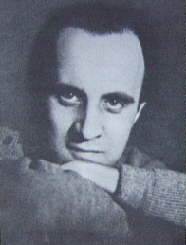Wolfgang Borchert (Wolfgang Borchert)

Author. Considered by many to be one of the leading figures in German post-war literature, the so-called Trümmerliteratur, or “Rubble Literature”, which attempted to deal with the lost war and the devastation that resulted. He was from an artistic family and was anti-Nazi from the start, as he refused to attend Hitler Youth meetings. He left school without graduating and took up an apprenticeship with a book seller while studying acting. Shortly after joining an acting company, he was drafted into the Wehrmacht and served on the Eastern Front. He was accused but not convicted of injuring himself to avoid further service, after returning from patrol missing a finger. He was able to be transferred to an army acting troupe, but was sentenced to prison for mocking Goebbels’ speeches in the barracks. Released from prison to continue serving in the army, his company surrendered to the French in March 1945. He then escaped on the way to a POW camp, and walked home to Hamburg, falling very ill on the way. He returned to his theater work and also began a furious phase of writing, during which most of his most famous works were created, mostly poems and short stories (the forms for which he was most famous), as well as his only play, “Draussen vor der Tür” (“Outside, In Front of the Door”), which was critically acclaimed. His family was told in 1946 that he was likely terminally ill, though he himself did not know of the diagnosis. In 1947, he went to Basel, Switzerland, to a sanatorium, hoping for a cure, but he died a few months later of liver failure, after finishing his final work, “Dann gibt es nur eins!” (“Then there is only one!”), an antiwar manifesto. (bio by: Kenneth Gilbert) Family links: Parents: Fritz Borchert (1890 – 1959) Hertha Salchow Borchert (1895 – 1985)
Born
- May, 20, 1921
- Germany
Died
- November, 11, 1947
- Switzerland
Cemetery
- Ohlsdorfer Friedhof
- Hamburg
- Germany

